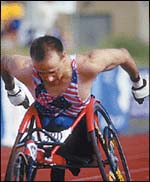Business Travelers With Disabilities Find Services And Access Could Improve Worldwide
by Maxine Cass
It should have been a routine business trip. Project manager Dan Kondej and quadriplegic Paralympic gold medallist Paul Nitz were traveling from the Hartford insurance company's headquarters in Connecticut to Maryland. But at disembarkation time, their MD-80 aircraft didn't align with the airport's extensible walkway and Mr. Nitz fell from his wheelchair. Then they discovered that the shuttle bus had no lift. The driver's solution? Mr. Nitz could either crawl up the steps or Mr. Kondej could carry him. Shocked, the men vowed that something positive would arise from this distressing experience. Three years later, the Hartford and its travel partners screen employee travel profiles for special needs and require that vendors meet those needs.
Facing obstacles Business travelers who use wheelchairs or walkers, who are blind, visually or hearing-impaired, or have conditions such as diabetes, face obstacles in planes, airports, hotels, taxis and other forms of transportation, restaurants and convention centers.
Cheryl T. Duke is president of Virginia-based W.C. Duke Associates Inc., whose Opening Doors® videos have trained hotel, restaurant, sightseeing and cruise line employees to serve those with disabilities. Ms. Duke and her husband, who both have disabling conditions, and their son Paul, who suffers from Duchenne muscular dystrophy and uses a wheelchair and respirator, frequently travel for business. They have encountered hotel rooms with platform beds where a wheelchair hoist can't move Paul into bed, narrow doorways, bathrooms with less than a 5-foot (1.5-meter) wheelchair turnaround space, inaccessible temperature controls and curtain pulleys, treacherous carpet pile and excess furniture. Ms. Duke's solution? Tremendous advance planning - all confirmed in writing. ''I could have helped General Schwarzkopf plan the Gulf War,'' jokes Ms. Duke.
In the United States, the American with Disabilities Act (ADA) specifies criteria for accessible accommodations and public facilities. The Air Carrier Access Act (ACAA) mandates what U.S. air carriers must do to insure that travelers with disabilities encounter minimal obstacles. Hotels and airlines outside the United States have varying standards - or none at all.
What can't be regulated, however, is employee attitudes toward guests with disabilities. Being helpful must be taught.


